-
BEST ENEMIES FOREVER/NEMICHE PER LA PELLE ( Luca LucinI 2016) N.I.C.
LUCA LUCINI: BEST ENEMIES FOREVER/NEMICHE PER LA PELLE (2016)
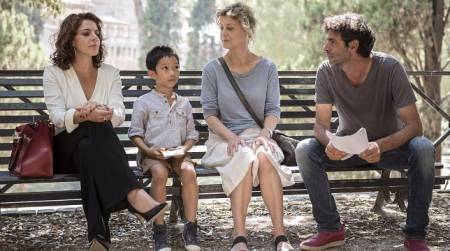
GERINI, CABAL, BUY, AND MORELLI IN BEST ENEMIES FOREVER
A boy gets two unlikely moms
In this broad comedy, a man dies, dividing his large estate between his two ex-wives, but they can share it only if they also share the care of his little illegitimate son. It's the material of simple farce, but from the start has the occasional good line, such as when real estate developer Fabiola (Claudia Gerini, by far the broader actress of the two) comments that her adversary Lucia (a typically restrained Margherita Buy)'s greater time with Paolo (12 years vs. 8) means nothing because one year with her is worth seven, as with dogs. The insult-trading goes only so far. Now comes the test: the kid they're saddled with,7-year-old "Chinese" Paolo, Jr. (Jaspar Cabal).
Well, the little Paolo is cute, but the abusive way he's treated by the equally careless and unqualified women isn't very pleasant or amusing, and the casual racism toward Asians (Fabiola's Filipino servants as well as little Paolo) would not be acceptable in a Hollywood movie. It's all in fun, of course; the political incorrectness is intentional and tongue-in-cheek. Lucia is a touchy-feely animal counselor devastated by the loss of her own canine, Gino, and saddled with a tiresome younger boyfriend, a pseudo-artist, Giacomo (Giacomo Morelli). She's useless in the everyday world, and can't even cook. Fabiola is a demonic boss who commands a small army of young male employees; she's particularly exploitative of an Asian one called Marco Chang, who's useful to her because of rich Chinese clients.
Things finally look up 45 minutes in surprisingly, with Fabiola (who's meaner than Lucia), when she calls upon Paolo Junior to be an interpreter (at age seven!) for some older Chinese buyers, and the kid gets to do some talking They grant him half the agent's 7;% of the sale. That night, he offers her his 3 1/2% if she'll just tell him a fairy tale at bedtime. Interestingly, though Fabiola has been more brutal with Paolo Junior, she's also interacted with him more, and given him a smart phone and a play station, gaining points.
Once the kid gets to play an active role (Jaspar Cabal is very good), things really look up. The filmmakers ought to have brought him in earlier, and toned down the nastiness at the outset, which is off-putting. And then, strangely, with 25 minutes to go, they leave the kid and we're stuck with the two eccentric dames. The twi actresses get a good rhythm going, but the material seems spread a bit thin at this point. Then Paolo Junior reappears, and things turn adorable again. A contemporary Italian comedy with a high cuteness count.
Best Enemies Forever/Nemiche per la pelle, 92 mins., was released theatrically in italy 14 Apr. 2016. Screened for this review as part of the SFFS's New Italian Cinema series, 16-20 Nov. 2016; special screening, Vogue Theatre, Wed., 9 p.m., 16 Nov.
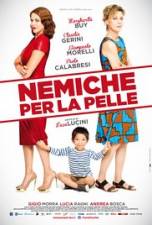
-
AFRO-NAPOLI UNITED/LORO DI NAPOLI (Pierfrancesco Li Doni 2015)
PIERFRANCESCO LI DONI: AFRO-NAPOLI UNITED/LORO DI NAPOLI (2015)

Immigrant footballers become a winning Naples team
The Afro-Napoli United soccer team was born in Naples in 2009. It was a team of immigrants from Africa and South America, second generation Italians, and Neopolitans. The protagonists of this documentary tale are Adam, Lello and Maxime, all players of the Afro-Napoli United team, and the team's tough, ever-present founder and president, Antonio Gargiulo. Through the lives of these individuals, Loro di Napoli tells the tale of their unstoppable integration and the delays and hostilities they encounter with Italian laws in a long, drawn-out battle for recognition and stability. (Loro di Napoli is a play on words, combining the Gioseppe Marotta's book filmed by Vittorio de Sica with the phrase, "those of Naples," implying these men, ultimately, are an integral part of the southern city.
Li Doni's film is intimate and alive, in a modern documentary style that feels sometimes like a feature film. Events move from the president's efforts to get the team registered, where the hangup is a lack of official residency papers (even though the players are legal residents), on to the first federation games, in which they don't do well. Perhaps the players are weighed down by other problems. They are separated from their families, or their wives and kids. They get into legal trouble for selling knockoff items. They use drugs, lack discipline. It is clear from the way Gargiulo lectures them that they are very young and green: he has to make clear to them what being a professional player is - which is interesting, because we are seeing a team created as it were from scratch. But this is a success story, Li Doni just presents it in a gritty style. DP Chiara Caterina, editor Matteo Gherardini, assistant camerapersons Piero Li Donni, Iacopo Di Girolamo.
Afro-Napoli United/Loro di Napoli, 69 mins, was presented at the Florence Panorama del Festival dei Popoli 2015, and included in a number of other festivals. Screened for this review as part of SFFS's New Italian Cinema 2016, where it showed 17 Nov. at 4:40 pm.
-
GIORGIA CECERE: SOMEWHERE AMAZING/UN POSTO BELLISSIMO (2015) - N.I.C.

ISABELLA RAGONESE IN SOMEWHERE AMAZING
Nothing amazing here
In Giorgia Cecere's unrewarding film Somewhere Amazing/In un posto bellissimo Isabella Ragonese plays Lucia, an uptight, constricted married woman who lives with her husband, Andrea (Alessio Boni) and teenage son, Tommaso (Michele Griffo), and runs a flower shop with a female partner, Carla (Tatiana Lepore). A nice life, the blurb says. But who says so? She takes no joy in it whatever, clearly. And it's hard to see much of a change in her or her life at film's end. Ragonese in this movie reminded me of the sad repressed plainness of Betsy Blair in Juan Antonio Bardem''s Calle Mayor, but without the powerful plot line.
In reviewing Cecere's previous feature, The First Assignment (2010), I commented that there was "virtually no there there," and that applies even better to this meandering tale, coauthored by Pierpaolo Pirone as was the previous film. The latter at least had the distinctive trajectory of a young woman (played again by the plain-Jane Ragonese) being sent to a remote location to teach and thus getting separated from the man she loves. What happens here is much more vague. Nobody goes anywhere, and any transformations are strictly in the eye of the beholder.
One of Andrea's female coworkers approaches Lucia one day and tells her that her husband is "unusually interested" in someone at work. She never asks for specifics or challenges Andrea. She simply begins acting strangely. When the family goes on an outing and her husband is impulsively going with Tommaso for a swim, someone comes and grabs his trousers, which turn out to have his watch in the pocket. Later she spots the culprit, an apparently homeless young Arab called Faysal (Faysal Abbaoui) living by selling toys and other junk. Lucia not-quite-befriends Faysal, except that he's (understandably) none too friendly and she's too withdrawn to make a real connection. She just sort of stalks him. This is apparently meant to be a sign of her estrangement from her life and her need to connect.
Meanwhile Lucia starts taking driving lessons, which involve practical sessions and classes with a lonely teacher called Alessio (Paolo Sassanelli), who has a sick dog, and takes an interest in her. When he asks her for dates she never says she's married or gives him a definite answer, till one day she rather abruptly says she will never sleep with him. One of the young women in the class befriends her, and she goes dancing with her and others, fitting in, up to a point, with the younger crowd. She keeps running into Faysal.
One day in winter when the weather is bad she finds Faysal clearly ill, coughing and with a high fever, and when he refuses to let her take him to a doctor or hospital, takes him home and has him lie on the living room couch. Tommaso and his schoolmate are shocked by this, and call his dad, who comes home and expels the unfortunate Faysal - who is never heard from again. A cohort reports he left his bag and possessions in "the gardens" where he takes refuge.
A blurb suggests that her "act of kindness" to Faysal inspires Lucia with confidence and moves her to revive her life. But her "kindness" has amounted to less than nothing, since she has lacked the will to stand up to her husband and protect the sick young man from being cast out into the street. Faysal may well have died after Andrea kicks him out. Any confidence inspired by this chain of events would be ironic indeed.
As the film drags on, Lucia gets her driving license and annoys Tommaso by wanting to take him on a drive. She sees Alessio, the driving instructor, again; he has acquired a fresh, female dog. So what? This is an example of Italian cinema's current tendency to blandness swerving into utter pointlessness. The meaninglessly titled Somewhere Amazing is an exercise in futility. It is as muddled and timid film. Jay Weissberg of Variety called The First Assignment "unexciting and uninvolving." No change this time, and more than one Italian critic, such as Enrico Azzano in Quinlan and Federico Boni in cineblog, agree.
Somewhere Amazing/Un posto bellissimo, 99 mins., released in Italy 27 Aug. 2015, was shown at Göteborg 30 Jan. 2016. Screened for this review as part of the 2016 SFFS New Italian Cinema series, showing 6:30 p.m. 17 Nov. 2016.
Last edited by Chris Knipp; 11-16-2016 at 05:39 PM.
-
THE INVISIBLE PLAYER /IL GIOCATORE INVISIBILE (Stevano Alpini 2015)
STEFANO ALPINI: THE INVISIBLE PLAYER/IL GIOCATORE INVISIBILE (2015)
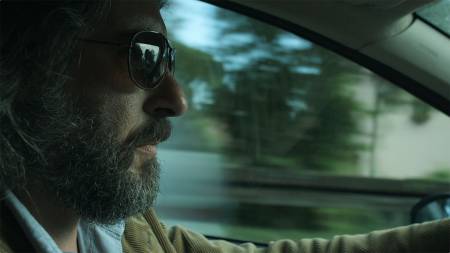
Searching out a blemish in a perfect world
"Professor Nari is an eminent university professor in Pisa slandered by a mysterious anonymous letter “accusing” him of making a banal error in an article about betrayal. Who could hate him so much as to denounce him publicly? In this masterfully shot drama, suspicion turns into obsession and not even his dalliance with the young Olivia can assuage his anxiety about the loyalty of the people who surround him. Nari’s wife Anna betrays him with a former student, while Professor Daverio—Nari’s departmental nemesis and rival for Anna’s love—appears a likely suspect. Once sure of Daverio’s “guilt,” Professor Nari grows increasingly uncertain of his attacker’s identity. The Invisible Player, Stefano Alpini’s riveting drama (and first narrative feature), is based on the novel of the same name by Giuseppe Pontiggia. Enhanced by Pisa’s beauty and a driving sound score, this taut narrative effectively demonstrates how an accusation can trap a man in the mystery of his own mind. Alpini’s film deliciously teeters between a detective story, a comic treatise on the neuroses of academics, and a tribute to Godard, whose work is a touchstone for Professor Nari (and probably for Alpini, too). Luca Lionello (Judas in The Passion of the Christ) is brilliant as a professor with an overactive imagination and an academic’s appreciation for nuance and departmental treachery."
So says the New Italian Cinema series blurb for this handsome film, he first feature by Stefano Alpini adapted by Paolo Serbandini and Giovanna Massimetti, from the novel by Giuseppe Pontiggia, gorgeously photographed (by Antonio De Rosa) and indeed with a striking, forceful score that's especially apt during sweeping aerial shots of the rigorously uniform and beautiful old center of Pisa. The images of the classic, unspoiled city remind me of the hotel employee in Rome who said to me many years ago (in Italian) "Isn't it true that Italy is the garden of the world, and Rome is the garden of Italy?" Pisa is one of the gardens of Italy too. Even the buses are special, large, square, posh-looking, of an orangish tone that somehow is superior. Nari (Luca Lionello) has a lovely life. The nice suits he wears! The literal palace he and his lovely wife live in! The men's outfits! The tastefulness of everything! I like that instead of calling people on his cell phone or emailing them, he goes around on bus or train to see them in person. For fans of Italian cinema, The Invisible Player is worth it. Director Stefano Alpini and his dp don't allow anything remotely ugly ever to enter the screen. This is an idealized version of the old Italy, which had no immigrants from the EU or outside it. Even the graffiti are few and handsome-looking, and one high, perfect wall is covered, surprisingly, but welcomely, by a masterpiece fy Keith Herring.
Luca Lionello has a kind of false swagger, with his swishy walk and his delicate little feet, his way of crossing his legs and folding over his hands, and his nice suits and handsome bushy hair and beard; he is like a miniaturized version of the artist and director Julian Schnabel without the wild creative edge. After a while, you begin to realize that he's just a colossal egotist, and that a larger man would have something better to do than this futile search to track down a personal slight. But, of course, this is a satire on academic insularity and academic self absorption. An enjoyable film, but strictly festival or limited art house stuff, and handsome to look at though it is, it ends none too soon.
The Invisible Player/Il giocatore invisibile, 98 mins., Salento Festival; won the Special Jury Prize at WorldFest-Houston. Screened for this review as part of the SFFF New Italian Cinema series, 16-20 Nov. 2016.
Last edited by Chris Knipp; 11-17-2016 at 09:47 AM.
-
STREET OPERA (Haider Rashid 2015)
HAIDER RASCHID: STREET OPERA (2015)
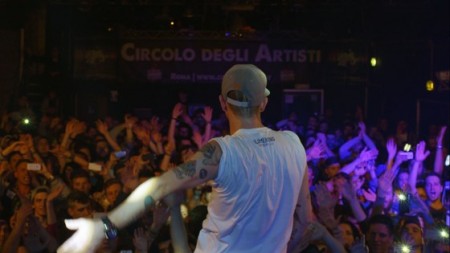
A documentary history of Italian rap
This documentary spans three decades of development of the art of rap in Italy. It's surprising: who even knew the Italians had rap? And it's particularly important and encouraging, because, unlike the US or UK, Italy had a pop music that was rather anemic. Their rap is strong and alive. Here we see a vibrant popular art developing, with obvious intense public participation. Furthermore it's a distinctive variation on the genre - if not universally. There are some Italian rappers who look like copies of US gangsta types, with the tattoos, the swearing, the gold chains, the flouting of macho gestures. Anyway, it is, whether we like it or not. IT's part of a world of politics and social life in Italy thats a long way from Antonioni, Cinnecittŕ, or boys riding around Rome in top-down Alfa Romeos.
Important that the film runs one by one through a series of Italian rappers, Clementino, Gué Pequeno, Damage, Torment, and Elio Germano, actor and rapper in the Bestierare group - because in this way we see that the genre offers individuals a chance to become themselves. Even if the technique of rapping is superficially the same, it allows each person maximum freedom to express (him)(her?) self in a personal way.
From the earliest one, Clementino, we see that rap for Italians was a way to be more engagé and political than other musical forms allowed; it offers the possibility of responding to events of the moment, immediately. Clemintino speaks of rapping "off your head" (using the English words), evidently meaning "off the top of your head," totally improvised in the moment. This he said is the form that he is happiest with.
When all this is said, Italian rap still does seem somewhat derivative. And I don't hear in these artists the verbal brilliance of an Eminem (whose "Campaign Speech" gives James Joyce a run for his money), or the passion, soul, sexiness, or complexity of a Kanye West (as in "Fade (explicit)") of some of the other best US black rappers. But that's not the point. This documentary puts us in touch with contemporary Italian popular culture we didn't know about before.
Street Opera, 72 mins., debuted 16 Oct. 2015 at the Rome Film Festival. Screened for this review as a part of the 16-20 Nov. 2016 San Francisco New Italian Cinema series where it showed at the Vogue Theater 18 Nov.
-
THEY CALLED ME JEEG ROBOT/MI CHIAMAVANO JEEG ROBOT (Gabriele Mainetti 2015)
GABRIELE MAINETTI: THEY CALLED ME JEEG ROBOT/MI CHIAMAVANO JEEG ROBOT (2015)
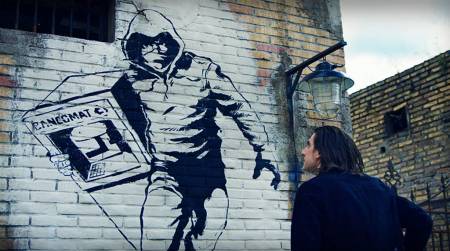
LUCA MARINELLI IN THEY CALL ME JEEG ROBOT
Superhero knockoff knocks Rome and Italy's failings
Following Nicola Guaglianone and Menotti (Roberto Marchionni)'s screenplay Gabriele Mainetti has made a highly original debut feature about Enzo (Claudio Santamaria), a Roman petty gangster who develops superpowers through falling into a toxic waste drum in the river Tiber. Falling off a nine-story building and surviving after a botched robbery tips him off that he's now Teflon, and then some. Mainelli's charming, gritty flick - perhaps the most talked about in Italy this year - is rich in Roman local color, romance, moral advice and political and social commentary. What it lacks in polish or profundity it makes up in warmth and punch.
Enzo must negotiate his very ordinary personality through the world created by his new celebrity. He learns to care about humanity through his unexpected romance with Alessia (Ilenia Pastorelli), an emotionally damaged young woman who thinks he's the Japanese manga character Steel Jeeg. "Jeeg" has misfires - ripping out an ATM machine for the dough activates a liquid marking system - and must fight clever bad guys like the slick pretty-boy gang leader Fabio (Luca Marinelli).
In his enthusiastic review in Variety Jay Weissberg comments that while this film "doesn’t conjure the understated magic of last year’s Vincent, They Call Me Jeeg fits into a new, distinctive brand of European superhero film, creatively playing with the rehashed formulas that persist in U.S. productions." Occasionally US movies have also reexamined the theme, as in Peter Berg's Hancock starring Will Smith as an alcoholic bum with superpowers that points out how un-ecological and wastefully destructive being a superhero is. Ever notice the billions of dollars worth of CGI damage Hollywood Batmen and Supermen do in the course of their "good works"? Enzo/Jeeg doesn't really do that much, and what makes the film engaging is that what happens, other than his feats, seems quite real.
A rivalry between Enzo and Fabio - a sociopathic talent contest runner-up - arises when Enzo's ATM ripoff film goes viral, making Fabio wildly jealous of his sudden fame - a topical allusion to Italy's reality-show obsession that was focused on in Matteo Garrone's 2013 film Reality. Mainetti also alludes to the Rome-Lazio Mafia Capitale scandal showing exploitation of immigrants and collusion between gangsters and politicians to sidetrack public funds. Constant news items about terrorist bomb threats are used to sow general panic so the mafia can sidestep law enforcement.
The trouble with a movie like this, which juggles things to say and atmosphere with maintaining a story-line, is that it may meander, but Weissberg commends the editor Andrea Maguolo for justifying extra scenes just when it was starting to seem a bit too long. I fear that at times it may feel inconsequential, but it still balances intense local Roman and Italian interest with general appeal and has a cult future everywhere.
They Called Me Jeeg Robot/Mi chiamavano Jeeg Robot, 112 mins., debuted Oct. 2015 at Rome, showing in 16 other mostly Italian-related or fantasy-related festivals and opening theatrically in Italy 30 Jan. 2016. It first showed in the US at the June 2016 Lincoln Center Open Roads Italian series. Winner of the 2016 David di Donatello awards for best debut director, best actor, actress, supporting actor and supporting actress and best editor. Screened for this review as part of the San Francisco New Italian Cinema series Nov. 16-20, 2016. It received the audience-ballot NICE City of Florence Award for this series.
Last edited by Chris Knipp; 11-21-2016 at 05:31 PM.
-
DON'T BE BAD/NON ESSERE CATTIVO ((Claudio Caligari 2015)
CLAUDIO CALIGARI: DON'T BE BAD/NON ESSERE CATTIVO (2015)
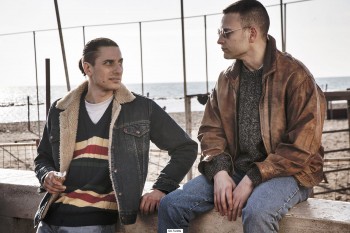
LUCA MARINELLI AND ALESSANDRO BORGHI IN DON'T BE BAD
Intense life on the Roman margins
Italy’s submission (though not a finalist) for the 2015 Best Foreign Oscar was Don't Be Bad/Non essere cattivo, the late Claudio Caligari's seventh and final film. Caligari, who died of cancer at the age of 67 during post-production, made four features and three documentaries, little known outside Italy but admired for their authentic focus on marginal Roman lives of drugs and petty crime. Don't Be Bad's failure to win Oscar finalist status may be traceable to its relentless, unstructured pace. What holds the attention are the energetic, committed performances of Alessandro Borghi as Vittorio and, even more so, Luca Marinelli (also seen as the nutty young mafioso "Gypsy" in N.I.C.'s They Call Me Jeeg) as Cesare. They play two young pals in 1995, inseparable since childhood, who do a lot of drugs, mostly coke and pills with a variety of exotic nicknames, and indulge in petty crime together. The setting is a suburb of Ostia, the seedy seaport town so dear to Pasolni and also the setting of Fellini's debut film I Vitelloni. There are occasional scenes of hanging out at an outdoor café that resemble Fellini's.
Vittorio doesn't handle the drugs as well, or goes deeper into them, and after he has an all-too-real Felliniesque hallucination of a wild crowd around a bus in the middle of the road and then sees the Devil's face in a frying pan he renounces drugs and gets a construction job. He tries to get Cesare to join him, but Cesare's idea of work is to tear up the workplace and con the bosses out of money. Their ifestyles drift apart and they struggle to maintain their bond, but when Cesare's little sister Debora (Alice Clementi) dies after a long doomed illness (his home life is relentlessly downbeat), the film's overly busy opening hour finally pauses as, grieving together, the two man do drugs together again.
Caligari was influenced by Pier Paolo Pasolini in telling the story of the Italian fringe drug culture. He spent years researching and documenting addiction. His 1983 documentary Amore tossico ("Toxic Love"), which examines heroin addiction, had attained semi-cult status. There is little knowledge of Caligari and almost nothing has been written about him in English. For an exception see Ruben Demesure's "A Cinema of the Margins: The Curious Case of Claudio Caligari" in Cinema Scope.
Italy had a shortlist of nine films for Best Foreign submission that included Mario Martone's Leopardi, Cristina Comincini's Latin Lover (N.I.C. ), Piero Messina's The Wait, Nanni Moretti's US-released Mia Madre (NYFF 2015), Sergio Castellitto's You Can't Save Yourself Alone, Giuseppe M. Gaudino's For Your Love, Marco Bellocchio's (much admired and internationally feted) Blood of My Blood, and Laura Bispuri's Sworn Virgin (SFIFF 2015).
Don't Be Bad/Non essere cattivo, 100 mins., debuted out of competition at Venice Sept. 2015; also four other festivals including Göteborg. Released in France 11 May 2016 as Mauvaise graine it was a mild critical success (AlloCiné press rating 3.3/14) but Les Inrocks noted the two actors are "remarkable" and Caligari "shows a profound tenderness for his characters." Its awards include a whopping five Davide di Dontello awards and eight nominations; seven prizes at Venice and other Italian awards. Screened for this review as part of the San Francisco New Italian Cinema series (16-20 Nov. 2016).
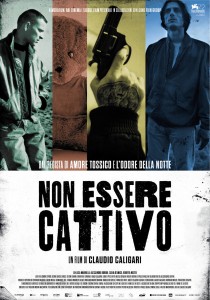
Last edited by Chris Knipp; 11-20-2016 at 11:10 AM.
 Posting Permissions
Posting Permissions
- You may not post new threads
- You may not post replies
- You may not post attachments
- You may not edit your posts
-
Forum Rules






 Reply With Quote
Reply With Quote







Bookmarks